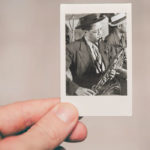
The touring lifestyle appears glamorous at first glance: new places, changing the scenery, the excitement around every corner. Not the same tired old routine each day, but something different and fun. Yes, certainly it can be fun – but also difficult in ways one would not initially expect.

Take, for example, airplanes. The days of luxury travel, accommodating service, and a variety of choice are gone. There are hardly any upgrades, comfortable seating, or room for carry-ons. Not to mention making a change to a set itinerary can be a bigger headache than just canceling that flight altogether and eating the cost. When changes happen – and they do, often – there is a penalty and the price of tickets skyrockets. Because of this, flying can be a stressful and expensive process for musicians. What was once a convenient and quick way to cross long distances has become one of the most difficult ways a gigging musician can travel.
Most musicians will choose to carry their instruments directly on a flight rather than risk having it loaded with checked luggage. Not only are instruments expensive – some ranging in the tens of thousands of dollars – but many are irreplaceable, customized to suit the musician’s personal needs. Unfortunately, most airlines do not train their employees on how to handle instruments. When a musician shows up at the gate with their livelihood in a case, many times they are informed that there is no carry-on that size allowed and that they must pay hundreds of dollars extra to take it aboard. In some instances, instruments have been dumped haphazardly on the ground during luggage checks, which could incur hundreds of more dollars in expense to repair the damage.
What can you do when you are on the road with a last-minute scheduling change? There are many issues: pre-booked hotels and airlines that will not refund your money; communication with the bandleader and other members of the group as necessary; scrambling to make any necessary changes so that any subsequent gigs are not missed; even finding food to eat that is fairly healthy so musicians aren’t forced to eat greasy fast food every night. Any of these problems can make or break a tour. All a manager can do is take a deep breath, hunker down, and find solutions in order to move the group forward to the next gig.

Not long ago, in the middle of a four-gig tour, the inevitable happened: an engagement was canceled. Keep in mind that when traveling with a small select group there is no one designated to handle changes for you. The musicians are preparing for the gig. Plans have already been made to fly to the next location and then take a train from there. In most cases, the band leader has all of the pressure and must take the heat and come up with solutions. But when the group is part of a jazz agency like Night is Alive, the responsibility falls on the Managing Director’s shoulders.
Attempts to call the airline did not get the group anywhere, as they were unsympathetic to the predicament. To top it all off, a canceled gig meant a day of lost income for everyone on tour. Thankfully, in these situations, most band members are very understanding, knowing that cancellations can happen at any time at no fault of anyone in the group. But they must still find a resting place for the evening off. In this case, the group was close to home and they were able to spend the night in their own beds. Luck like that is not common, however, and often the group will find themselves out not only the cost of the flight but also the price of last-minute hotel accommodations that evening.
In contrast to airplanes, trains can be an enjoyable and forgiving way to travel. Credit can be used for an unexpected change with no extra charge. Carry-ons are also free, as well as luggage itself, so food and water bottles and instruments can travel safely with no additional worry. The flexibility of being able to change your seats, have access to a club car, and use free Wi-fi is invaluable. Additionally, most train stations are refurbished, updated, and accommodating. Traveling by train is unfortunately very limited, but when the option is available there is no questioning whether it is the correct choice.
Though touring itself can be interesting and fun, the novelty can wear off very quickly if you find yourself in a situation where travel needs to be changed due to last-minute cancellations. If you are a bandleader trying to take care of all the details yourself, it can taint the whole touring experience. But with a Managing Director on your side, the responsibility is greatly reduced and you can rely on someone to handle everything and keep the tour running smoothly. The music business is a great industry to work in, but to be a manager requires determination which is driven by a passion for music. Despite turmoil on the road, the manager must focus on giving the artist the highest probability of success and put them in the right environment to thrive. Respectable management is what defines Night is Alive and makes touring fun and rewarding for the musicians involved.
For more information about Managing Director Kathy Moses Salem and the musicians with Night is Alive, please visit our web page (https://nightisalive.com/) or contact directly via phone.
Article by Kathy Salem, Managing Director, Night is Alive
Revised and Transcribed by Elizabeth Carney, Content Editor, Night is Alive



